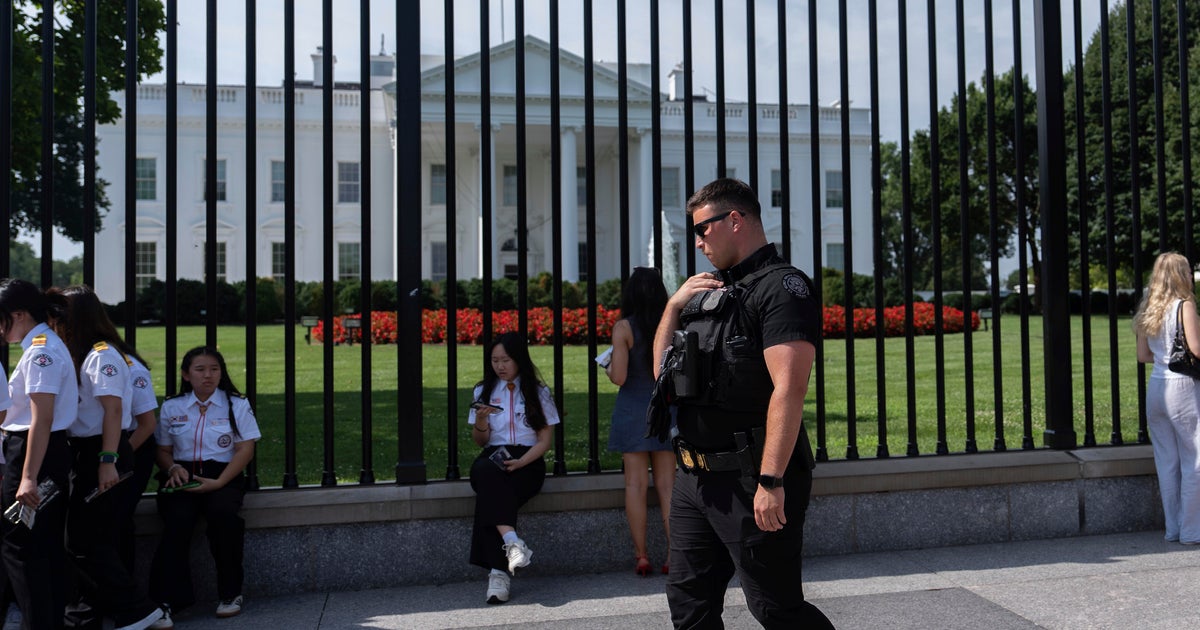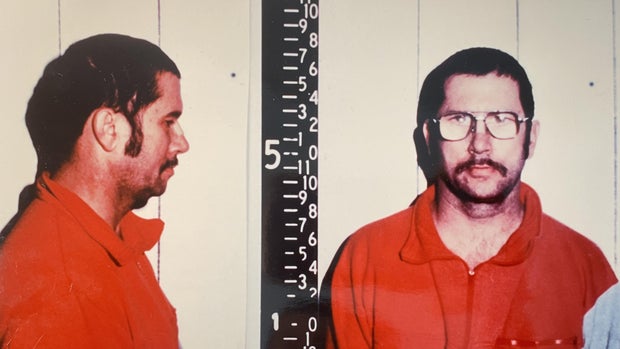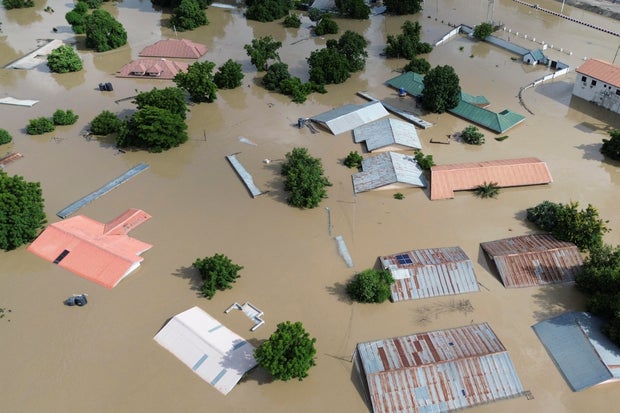CBS News
How a 12-year-old Massachusetts girl who escaped a serial killer likely saved the lives of others

Jan. 7, 1994, started out like any other typical winter morning for Rebecca “Becky” Savarese of Pittsfield, Massachusetts. There was snow on the ground, and it was bitterly cold as the 12-year-old walked to school. Then, at around 7:10 a.m., at one of the busiest intersections in town, a man came up beside her. “He had a mustache, but he didn’t shave. He seemed like a nerd to me,” said Savarese. The stranger quickly pulled out a gun and held it up against her.
Becky said the gunman threatened her: “Just do everything I say, everything will be perfectly OK.” Then he steered her toward his truck and told her to get in. But Becky refused. “I didn’t care if he shot me. I just knew I was not going to get into that truck,” she told “48 Hours.”
CBS News
Instead, that’s when Becky said she came up with an idea that possibly saved her life. She faked an asthma attack. She explained, “I was like, ‘Can I sit down? Can I just sit down a minute?’ I was trying to take my backpack off … and he tried to grab me, and he got my backpack and then I just started to run.”
The gunman jumped into his truck and sped off. Becky ran into a man clearing snow off a sidewalk who called police. At about the same time, a witness called in with three digits from the truck’s license plate.
Police learned that a 43-year-old handyman and former movie theater janitor named Lewis Lent had been driving that truck. He at first denied knowing about Becky Savarese, but he later confessed to trying to abduct her.
When police searched Lent’s truck they found disturbing evidence. New York State Police Detective Reece Treen said they found “Rebecca’s backpack. They found a gun. They found what Lou called his ‘snatch kit.’ Duct tape and a clothesline rope. Basically, his kidnapping abducting kit he had with him.”
After Lent was arrested for the attempted abduction of Becky Savarese, authorities wondered if Lent could have abducted other children — including a 12-year-old-girl who had disappeared five months earlier. Sara Anne Wood, from Sauquoit, New York — 100 miles from Pittsfield — was last seen on her bike, leaving church as she was headed home less than a mile down the street.
New York State Police
When authorities questioned Lent about Sara’s disappearance, he eventually confessed, in horrific detail, that he abducted, sexually assaulted and killed Sara. He also admitted to kidnapping and murdering 12-year-old Jimmy Bernardo from Pittsfield.
Hunters had found Jimmy’s body in a rural and isolated area 200 miles away from Pittsfield. But detectives had no idea where Sara was buried. When they asked Lent, authorities say he continuously lied as to where he buried her.
The search for Sara and the cat-and-mouse game between authorities and her killer to get him to reveal where her remains are located is the focus of “The Unending Search for Sara Anne Wood.” Correspondent Erin Moriarty reports in the season premiere of “48 Hours,” airing Saturday, Sept. 21 at 10/9c on CBS and streams on Paramount+.
Authorities credit Becky for breaking Sara’s abduction case wide open. New York State Police Detective Frank Lawrence said, “She’s the key, she’s the linchpin. She’s what made it all happen … She got away … That’s what put us on to Lewis Lent.”
Treen, who spent many long hours interviewing Lent in prison, said that Lent admitted he would often drive for many miles hunting for children to kidnap. “(Lent) had a large hunting area. He mentioned that if he had money and he had the gas, that’s what he would do … he would go out looking for vulnerable children.”
New York State Police
But Becky Savarese’s bravery and quick thinking changed all of that. In 1995, Lent was convicted for her attempted kidnapping and was sentenced to 17 to 20 years in prison. In 1996, after taking a plea, he was given a life sentence for murdering Jimmy Bernardo. Then, later that year, Lent pleaded guilty to killing Sara Wood. In 1997, he was sentenced to 25 years to life for her murder. Lent will serve the rest of his life in prison. Sara’s brother Dusty Wood said, “He (Lewis Lent) will never cause harm to anyone else.”
Herkimer County District Attorney Jeffrey Carpenter often wonders what would have happened if Becky had not been able to escape. “I think Becky Savarese not only saved herself, she saved countless children because this man (Lewis Lent) was developing his skills. He was getting better at it. She outsmarted him … and brought an end to his reign of terror,” he told “48 Hours.”
Back in 1994, Becky’s mother, Chris, told “48 Hours” that she often lectured her daughter about the steps to take in case she was ever abducted: to “kick, punch, bite, spit and do anything to get away.” Becky had also been warned about strangers from a policeman who came to her school the year before the incident.
Dusty Wood says Becky’s actions are an example as to why educating youth about abduction prevention is so important. “If no one had said anything to Rebecca … she would have had a different outcome.”.
Every year, Dusty Wood and some family members participate in the “Ride for Missing Children,” a 78-mile bike ride that was created in Sara’s honor by their father Bob Wood. Riders stop at schools along the route to talk to children about how to stay safe. Riders also pay silent tribute to those children who are missing and never coming home and those that they hope may be found alive.
Dusty Wood says he cannot do anything to bring his sister Sara back, but he can try and make positive change by educating the public about how to keep children safe. He told “48 Hours,” “The most important thing for us as a family is to protect kids … and make sure that if there’s anything that can be done to protect them from monsters like Lewis Lent, that it be done.”
To learn more about how to educate children about abduction prevention, please visit the National Center for Missing and Exploited Children website missingkids.org.
CBS News
Deadly flooding in West and Central Africa leaves corpses of crocodiles and snakes floating among human bodies

Houses swept away to the very last brick. Inmates frantically fleeing the city’s main prison as its walls were washed away by water rising from an overflowing dam. Corpses of crocodiles and snakes floating among human bodies on what used to be main streets.
As torrential rains across Central and West Africa have unleashed the most catastrophic floods in decades, residents of Maiduguri, the capital of the fragile Nigerian state of Borno — which has been at the center of an Islamic extremists’ insurgency — said they have seen it all.
Earlier this week, Nigerian authorities said more than 270 inmates were missing after escaping from custody when severe flooding damaged a prison in Maiduguri, CBS News partner BBC reported. Borno state Governor Babagana Zulum described the extent of the damage in the area as “beyond human imagination.”
The floods, which have killed more than 1,000 people and displaced hundreds of thousands across the region this year, have worsened existing humanitarian crises in the countries which have been impacted the most: Chad, Nigeria, Mali and Niger. Over four million people have been affected by flooding so far this year in West Africa, a threefold increase from last year, according to the U.N.
With rescue operations still underway, it is impossible to give an accurate count of lives lost in the water. So far, at least 230 were reported dead in Nigeria, 265 in Niger, 487 in Chad and 55 in Mali, which has seen the most catastrophic flooding since the 1960s.
While Africa is responsible for a small fraction of global greenhouse gas emissions, it is among the regions most vulnerable to extreme weather events, the World Meteorological Organization said earlier this month. In sub-Saharan Africa, the cost of adapting to extreme weather events is estimated between $30-50 billion annually over the next decade, the report said. It warned that up to 118 million Africans could be impacted by extreme weather by 2030.
Maiduguri, the capital of Borno state, has been under significant strain. Over the last decade, Borno has been hit by a constant string of attacks from Boko Haram militants, who want to install an Islamic state in Nigeria and have killed more than 35,000 people in the last decade.
AUDU MARTE/AFP via Getty Images
Saleh Bukar, a 28-year-old from Maiduguri, said he was woken up last week around midnight by his neighbors.
“Water is flooding everywhere!” he recalled their frantic screams in a phone interview. “They were shouting: ‘Everybody come out, everybody come out!” Older people and people with disabilities did not know what was going on, he said, and some were left behind. Those who did not wake up on time drowned right away.
Local authorities are overwhelmed by the scale of the disaster: over 600,000 people in Borno state have been displaced, while at least 100 were killed and 58 injured, according to the U.N.
Last week, floods killed about 80% of the animals at the Borno State Museum Park and an unspecified number of reptiles escaped. Ali Donbest, who runs the Sanda Kyarimi Zoo, told the BBC that he does not know exactly how many wild animals escaped the zoo but a hunt was on to locate them. He also said the cages where the lions and hyenas were kept had been submerged by floodwaters but the zoo could not determine if they had escaped.
Maiduguri resident Ishaq Sani told the BBC his biggest fear is to come across a wild animal. He abandoned his home due to the floods and is now staying with a friend in another location.
The waters also knocked down the walls of the local police station and some of the government’s offices.
Rescue operations continue 10 days later, with some parts of the city returning to normal as waters recede.
Flooding forces woman to abandon her baby
Survivors recounted chilling scenes of bodies in the floodwaters.
Aishatu Ba’agana, a mother of three, had to abandon her recently born baby as water surging over her house overwhelmed her. “I yelled for my family to help me get my child, but I don’t know if they were able to. I haven’t seen any of them since,” she said, crying at the camp where rescue workers brought her.
The flood also destroyed crucial infrastructure, including two major dikes of a dam along Lake Alau. When the dam failed, 540 billion liters of water flooded the city. Key bridges connecting Maiduguri collapsed, turning the city into a temporary river.
Governor Babagana Zulum urgently appealed for international assistance. “Our resources are stretched to the limit, and we cannot do this alone,” he said.
The World Food Program has set up kitchens providing food to the displaced in Maiduguri as well as emergency food and cash assistance to people in the most hard-hit areas. USAID said Wednesday it has provided more than $3 million in humanitarian assistance to West and Central Africa, including $1 million provided in the immediate aftermath of the floods.
But many say they were left to fend for themselves.
Floods in mostly arid Niger have impacted over 841,000 people, killing hundreds and displacing more than 400,000.
Harira Adamou, a 50-year-old single mother of six, is one of them. She said the floods destroyed her mud hut in the northern city of Agadez.
“The rooms are destroyed; the walls fell down,” she said. “It’s a big risk to live in a mud hut but we don’t have the means to build concrete ones.”
Adamou, who is unemployed and lost her husband four years ago, said she has not received any support from the state and has not had the opportunity — or the means — to relocate. She and her children are living in a temporary shelter next to their shattered hut, and fret that the torrential rains might return.
“I understood there was a change in the weather,” she said. “I have never seen a big rain like this year here in Agadez.”
In Maiduguri, 15% of the city remains underwater, according to local authorities. As forecasts predicted more rains across the region, Nigerian authorities warned earlier this week that more floods are expected.
Bukar said he kept going back to see whether the water that swallowed his home had receded, but that has not happened. He said he has not received any aid from authorities except for some food items handed out at the local school, where he is sheltering with 5,000 others.
He is trying to stay sane by helping others. Along with his friend, he helped recover 10 bodies and rescued 25 people, rowing down the streets in a canoe. He said he’s also helping out cooking meals for those that are sheltering with him.
“I am volunteering to help, but I am also a victim,” he said. “Our people need us. They need help.”
The deadly flooding comes about five months after hundreds of people in Tanzania and Kenya died after heavy rain during the region’s monsoon season.
CBS News
House unanimously votes to boost Secret Service protection for presidential and VP candidates

Washington — The House unanimously approved a bill on Friday that would bolster Secret Service protection for major presidential and vice presidential candidates, following the second apparent attempt on former President Donald Trump’s life in two months.
The legislation would require the Secret Service director “to apply the same standards for determining the number of agents required to protect presidents, vice presidents and major presidential and vice presidential candidates,” according to the bill’s summary.
The final vote to pass the legislation was 405 to 0. The vote came as Republicans have voiced concerns about the Secret Service’s protection of Trump after the attempt on his life in Pennsylvania in July and an apparent assassination attempt at his golf course in Florida over the weekend.
The legislation is separate from measures that would approve additional funding for the Secret Service, something Congress is also pursuing as it looks to fund the government before an Oct. 1 deadline. President Biden told reporters this week the Secret Service should receive all the resources it needs. The Biden administration last month asked Congress for special permission to increase spending on Secret Service in the weeks ahead, even if Congress only passes a short-term spending bill to avoid a government shutdown, multiple congressional and administration sources told CBS News.
The House’s Secret Service bill would still need to pass the Senate. The bill was introduced by a bipartisan group of House members from New York and New Jersey, spearheaded by Republican Rep. Mike Lawler and Democratic Rep. Ritchie Torres. They introduced the legislation after the first Trump assassination attempt at a rally in Butler, Pennsylvania, that wounded Trump and killed one attendee.
“Elections are determined at the ballot box, not by an assassin’s bullet,” Lawler said on the House floor Friday morning. “That these incidents were allowed to occur is a stain on our country. We have endured through a assassinations of political leaders including presidents. It is destructive to our country, it is destructive to our democracy, our constitutional republic, and it undermines the confidence that Americans have in their government and in the electoral process.”
Torres said the difference between an attempted assassination and a completed one on July 13 was “luck,” not the Secret Service.
“Hoping for the best or lucking out is not a policy prescription for protecting a president or presidential candidate,” Torres said.
Democratic Rep. Jerry Nadler of New York said Republicans are ignoring a simple common denominator of every successful assassination attempt of a U.S. president, as well as multiple attempted assassinations.
“In every single one of these events, the weapon used was a gun,” Nadler said on the House floor. “The fact is that the work of the Secret Service is made infinitely more difficult by our lax gun laws.”
Republican Rep. Jim Jordan of Ohio claimed Nadler and Democrats are blaming Trump for what happened.
“They cannot help themselves. It’s ridiculous,” Jordan said.
Jordan said the legislation will help both Trump and Vice President Kamala Harris.
“That’s what we want in America,” Jordan said.
CBS News
9/20: CBS Morning News – CBS News

Watch CBS News
Be the first to know
Get browser notifications for breaking news, live events, and exclusive reporting.












